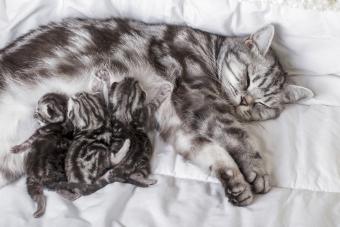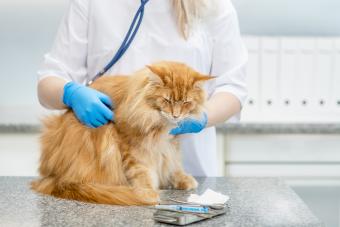
Just like with humans, cat labor is a multi-stage process filled with wonder, a bit of mystery, and adorable end results. Whether you're prepping for a litter of kittens or just satisfying your feline curiosity, learn what to expect before your cat goes into labor and what will happen in the stages of cat labor during this magical journey.
What to Expect for Each Stage of Cat Labor and Birth
There are several stages leading up to a cat giving birth to her kittens. Knowing which signs to look for can help you make sure your cat has a warm, comfortable place to birth her kittens. This will also help you know when to be concerned or when to let labor progress naturally.
Pre-Labor

A day or two before a pregnant cat is ready to go into labor, you may notice that she seems restless. The cat will look for a quiet, out-of-the-way place to give birth to her kittens, such as a closet, under a bed, or behind furniture. You can encourage the cat to give birth in a place you have chosen by placing warm blankets in that area. Include a bowl of water, and keep the area quiet and free of people.
Isolate your cat in the room where you'd like her to give birth so she doesn't choose an inconvenient or dangerous place to have her kittens.
Stage One: Beginning Labor
Once a cat actually begins labor, she will move to the area she has chosen to have her kittens. This first stage can last a full day. Your cat may pant a bit. She may be more affectionate or more aggressive than normal. She may also lick her genital area often, and many cats also lick their abdomens.
Stage Two: Kittens Are Born
When your cat begins the second stage of labor, she will stop eating. You can expect to see the newborn kittens during this stage. You may notice that your cat is squatting and pushing. This is normal. Let her progress through labor naturally and don't interrupt her. Kittens may be born fairly quickly together or as much as a couple of hours apart.
Once the kitten is out, the mother cat will probably take a short breather (she's earned it!) before breaking the amniotic sac if it hasn't already burst during the birth. She'll clean the newborns, stimulating their breathing and circulation — talk about multitasking!
Leave the newborn kittens alone to ensure your mother cat remains calm and stays in place.
Stage Three: Placenta

This is the final stage of labor. The placentas from the kittens are pushed out, and the cat eats these for the nutrients. She will probably nurse and clean her kittens during this time as well. Count placentas as they are expelled to be sure they match the number of kittens born.
Potential Complications During Labor
While a majority of cats give birth to healthy kittens with no problems, there are a few cases where cat owners should be concerned enough to take the cat to the vet for help. If your cat experiences any of the following complications, immediately take her and any kittens that have been born to the vet.
- Your cat is in labor for over seven or eight hours.
- A kitten has been in the birth canal for over ten minutes, and you cannot pull it out by gently grasping its hips or shoulders and pulling down (be extremely careful if attempting this, and never pull on the kitten's head or legs).
- Over two hours have passed between births, and you know there are more kittens in the uterus.
- You counted fewer placentas than kittens.
- The mother seems extremely lethargic and will not eat, drink and/or nurse her kittens.
- The kittens seem weak or lethargic.
It's normal to see a small amount of red to black discharge from the mother's vagina for up to ten days. However, if the discharge is an odd color or has a bad odor, this might indicate infection. In this case, your cat should be examined by your veterinarian.
Most Kitten Births Occur Naturally
Most feline labor and birth events occur naturally and with little stress to you or your cat. It's vital that you know your cat well enough to tell if she is in distress and needs medical help. More than likely, she will be a natural mother, and you'll wind up with a beautiful litter of newborn kittens.







